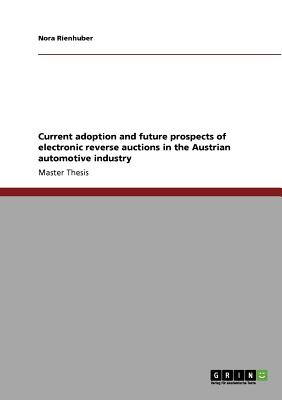
- We will send in 10–14 business days.
- Author: Nora Rienhuber
- Publisher: GRIN Verlag
- ISBN-10: 3640788052
- ISBN-13: 9783640788057
- Format: 14.8 x 21 x 0.5 cm, softcover
- Language: English
- SAVE -10% with code: EXTRA
Current adoption and future prospects of electronic reverse auctions in the Austrian automotive industry (e-book) (used book) | bookbook.eu
Reviews
Description
Master's Thesis from the year 2010 in the subject Business economics - Business Management, Corporate Governance, grade: 1, University of Plymouth, language: English, abstract: Especially after the recession, it is of interest whether electronic reverse auctions (eRAs), as e-procurement tool with a high cost saving potential, are attractive for companies. Therefore, the purpose of this study is the investigation of the current eRA adoption and future eRA prospects in terms of extent and way of usage in the Austrian automotive industry. Data were collected from purchasing managers and purchasing agents of 20 companies which belong to the 24 top-selling Austrian automotive companies. Quantitative data was collected from 20 companies regarding the extent of eRA usage. Furthermore, 18 of these participated in semi-structured interviews for qualitative data collection regarding reasons for (not) using eRAs and the way of eRA usage. Results of the data analysis show that the extent of eRA usage is and will remain quite low in the Austrian automotive industry and even adopters' eRA spending is fairly low. In conclusion, eRAs do not seem to contribute a lot to achieve cost savings in the Austrian automotive industry and are considered to be rather disliked by Aus-trian automotive buyers. Although findings cannot be generalised to the whole Austrian automotive industry they still might have the implication that buyer-supplier cooperation will prevail in the Austrian automotive industry in the future as it obviously contributes more to gain a sustainable competitive supply chain advantage than eRAs. Moreover, if other industries and countries have similar attitudes towards eRAs as Austrian automotive buyers, it might have negative implications on eRA tool providers, though this needs to be investigated in further research.
EXTRA 10 % discount with code: EXTRA
The promotion ends in 17d.03:02:15
The discount code is valid when purchasing from 10 €. Discounts do not stack.
- Author: Nora Rienhuber
- Publisher: GRIN Verlag
- ISBN-10: 3640788052
- ISBN-13: 9783640788057
- Format: 14.8 x 21 x 0.5 cm, softcover
- Language: English English
Master's Thesis from the year 2010 in the subject Business economics - Business Management, Corporate Governance, grade: 1, University of Plymouth, language: English, abstract: Especially after the recession, it is of interest whether electronic reverse auctions (eRAs), as e-procurement tool with a high cost saving potential, are attractive for companies. Therefore, the purpose of this study is the investigation of the current eRA adoption and future eRA prospects in terms of extent and way of usage in the Austrian automotive industry. Data were collected from purchasing managers and purchasing agents of 20 companies which belong to the 24 top-selling Austrian automotive companies. Quantitative data was collected from 20 companies regarding the extent of eRA usage. Furthermore, 18 of these participated in semi-structured interviews for qualitative data collection regarding reasons for (not) using eRAs and the way of eRA usage. Results of the data analysis show that the extent of eRA usage is and will remain quite low in the Austrian automotive industry and even adopters' eRA spending is fairly low. In conclusion, eRAs do not seem to contribute a lot to achieve cost savings in the Austrian automotive industry and are considered to be rather disliked by Aus-trian automotive buyers. Although findings cannot be generalised to the whole Austrian automotive industry they still might have the implication that buyer-supplier cooperation will prevail in the Austrian automotive industry in the future as it obviously contributes more to gain a sustainable competitive supply chain advantage than eRAs. Moreover, if other industries and countries have similar attitudes towards eRAs as Austrian automotive buyers, it might have negative implications on eRA tool providers, though this needs to be investigated in further research.


Reviews